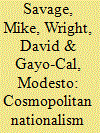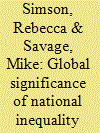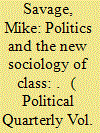|
|
|
Sort Order |
|
|
|
Items / Page
|
|
|
|
|
|
|
| Srl | Item |
| 1 |
ID:
099835


|
|
|
|
|
| Publication |
2010.
|
| Summary/Abstract |
In recent years, strong claims have been made for the breakdown of national boundaries and the reformation of national identities in an increasingly interconnected global world - driven in large part by the possibilities and limitations that emerge from an increasingly global media world. It has been argued that new postnational, cosmopolitan subjectivities accompany, enable and feed off globally oriented forms of cultural consumption. This article examines these claims in the light of unusually comprehensive data on the tastes of the white British population collected in a large national sample survey, in-depth interviews and focus groups. By identifying and analysing the geographical spread of the cultural referents of the tastes of the white British we make an empirical assessment of the claims for cosmopolitan identities. We argue that if white British identities are being reformed by processes of globalisation it is, paradoxically, in an increasingly Anglophone direction.
|
|
|
|
|
|
|
|
|
|
|
|
|
|
|
|
| 2 |
ID:
173904


|
|
|
|
|
| Summary/Abstract |
Since the 1980s, inequality has been rising in Europe, North America and parts of Asia. How does our understanding of global inequality dynamics change if coverage is extended to the rest of the developing world? To rebalance the perspective on global inequality trends, this paper surveys data and literature on recent inequality trends in Latin America, Asia, Africa and the Middle East. It finds that in these regions there are more countries with falling than rising inequality over the past 20 years, as measured by Ginis of income or consumption inequality. At the global level, therefore, there are signs of inequality convergence, as inequality has been falling in countries with high inequality in the 1990s (particularly Latin America), and rising in historically low-inequality countries. We discuss the political and economic drivers of inequality decline in countries with a steady fall in the Gini. This suggests some common trends across the globe, including the role of democratisation, the rise of new social movements, and the expansion of education and social safety nets and favourable commodity prices, in reducing income disparities. This paper calls for more country-level comparisons of inequality trends, to highlight the multiplicity of paths in this latest phase of globalisation.
|
|
|
|
|
|
|
|
|
|
|
|
|
|
|
|
| 3 |
ID:
156795


|
|
|
|
|
| Summary/Abstract |
Forty years ago, proponents of the ‘class dealignment’ thesis—such as Ivor Crewe and his collaborators—began to diagnose the declining salience of class in affecting electoral outcomes in the UK. Throughout the 1980s and into the 1990s, sociologists resisted this claim by insisting that if a rigorous model of class was used, and that if relative rather than absolute differences were examined, there was no decline, but only ‘trendless fluctuation’ in the class–vote relationship. A key intervention here was the adoption of John Goldthorpe's class schema, which distinguished between classes according to employment relationships, rather than a crude divide between manual and non-manual workers. Goldthorpe's approach proved much more discriminating, for instance in highlighting how business owners were more prone to support the Conservative party, and his thinking led to the National Statistic Socio-Economic Classification (NS-SEC) which was adopted by the Office of National Statistics.
|
|
|
|
|
|
|
|
|
|
|
|
|
|
|
|
|
|
|
|
|